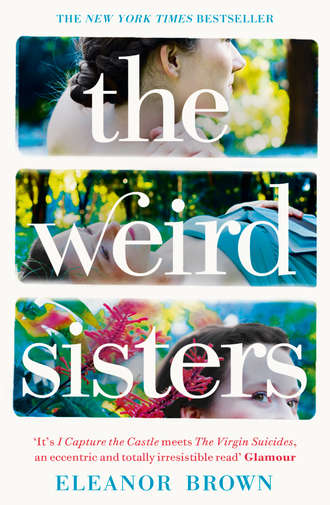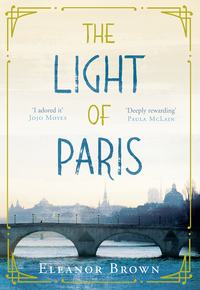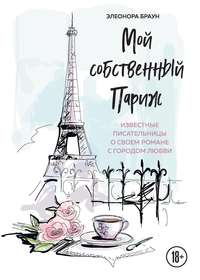
Полная версия
The Weird Sisters
‘Jesus, Rose,’ Bean moaned. ‘It’s not even seven. Shut the hell up.’ A lock of hair caught on her dry lips and she shoved it out of the way before rolling over and burrowing back into her pillow.
‘Mom has an appointment in Columbus at eight. We’re leaving in fifteen minutes.’
‘Goody. Shove off.’
Rose’s nostrils flared and she put her fists on her hips, glaring down at the covers piled on top of Bean. She was clearly the one who’d turned the air-conditioning down so low last night, buried as she was under a feather duvet. In June. Out of pure meanness, Rose reached out and yanked the covers off of Bean, who howled in protest and yanked them back.
‘Your mother is sick, you selfish brat. I told you last night we were going up for her next round of chemo, and you said you’d come.’
‘I did?’ Bean asked curiously, peering up at Rose’s glowering silhouette against the sunlight. It seemed remarkably unlike her to have agreed to something like that. And frankly, she didn’t remember it. Ever since the night at the bar, she’d been putting herself to sleep by drinking, and last night had gotten a little fuzzy after she’d polished off the bottle of wine she’d found in the refrigerator. Maybe she’d been in one of those happy drunk moods. Or more likely she’d agreed with whatever she assumed would make Rose shut up fastest.
‘Yes, you did. Now if your highness would kindly get dressed, we can leave. It’s not bad enough I’ve got to get them ready, now I’ve got to worry about you, too?’
‘I’m up,’ Bean said, tossing aside the covers and sitting up. ‘I’m up.’ The ‘bitch’ at the end of the sentence was understood.
Our parents listened to the radio the entire drive, while Rose sat in the back and seethed, and Bean marinated in the fumes of alcohol seeping out of her skin and tried not to vomit. The toothpaste had helped with her breath, but not at all with the dehydrated headache of white wine the morning after, and the minty taste on her thick tongue made her throat feel clogged.
Inside the hospital, Rose led the parade. Bean veered off toward a coffee cart, Rose yanked her back in line. Bean watched our parents walking together, the stroll of the long-partnered. Our father is an inch shorter than our mother, his hair shot through with gray, his neatly clipped beard gone respectably salt and pepper. They always walk with her arm in his, his free hand darting up a thousand times an hour to adjust his glasses, their steps matched perfectly, knowing each other’s gait. But at the doors to the outpatient clinic, Rose halted and sent our parents through alone. As the doors slid open, our father turned and kissed our mother lightly below the line of the silk scarf on her forehead. She accepted the tenderness like a benediction.
‘We’re not going in?’ Bean asked. She’d found the end of a roll of mints in her purse and popped one, only slightly linty, into her mouth. She snapped it with a firm crunch and grinned at Rose’s frown.
‘Only one visitor allowed. There’s not enough room. We’ll wait outside.’
‘We can’t go in? Then what the hell did we come up here for?’
‘Moral support.’ Rose hoisted her bag onto her shoulder and about-faced toward the seating area.
‘I could have been moral support at home,’ Bean grumbled quietly, but she followed along, procuring coffee on the way. ‘How long does this take?’ she asked, settling into the seat beside Rose.
Rose glanced at her watch. ‘We’ll be out of here by noon, I’d say. They have to check her blood first, and then the pharmacy has to put together the treatment, and then the chemo itself takes a few hours.’ She produced a book from her bag and opened it pointedly.
‘What are they going to do?’
‘He reads to her, usually. You did bring a book, didn’t you?’
Bean reached into her purse and pulled out a thick paperback, the covers hanging by the barest edges. Rose nodded and turned to read her own book. Inside, our mother would sit in one of the forgivingly vinyl hospital recliners while a tube dripped benevolent poison into her veins, and our father perched his reading glasses on his nose and read to her.
How can we explain what books and reading mean to our family, the gift of libraries, of pages? Even at Coop, the tiny professor-run cooperative school we’d attended, a refuge of overly intellectual families, we were different. ‘What do you mean you don’t watch television?’ one girl had asked Bean. She was new, her parents visiting professors who passed in and out in one calendar year, their sojourn so brief Bean cannot even remember the girl’s name. She remembers only the strange furrow to her brow, signifying the complete and utter incomprehension at the idea of a life without.
Except to us, it wasn’t a life without. It was a life with. For Rose, a life where, after our weekly trip to the library, she cleared the top of her dresser and set out her week’s reading, stood them on their ends, pages fanned out, sending little puffs of text into the air. One of her friends, a little girl with sunken blue eyes and parchment skin, laid her costume jewelry out in the same way, and even then, Rose had recognized the metaphor, standing in her friend’s white wicker bedroom, looking at the sparkle of paste, to her, dull by comparison. For Bean, a life where the glamour and individuality she sought was only the gentle flick of a page away. For Cordy, always slightly detached no matter how many people surrounded her, clucking for her attention, a life where she could retreat and be alone and yet transported.
In college, when it became clear people might think there were more interesting things to do than read, when it was apparent the only books appropriate for decorating one’s room were textbooks, weighty and costly, worth only their end-of-the-semester resale value, we were faced with a choice. Rose, who had never paid attention to the requirements of cool, carried on reading, her one concession choosing a single room after her first year, though this was probably more due to her penchant for cleanliness than for fear of being unmasked as a reader. Bean spent afternoons in the library, having discovered the classics room, filled with huge leather armchairs and ottomans, and walls lined with books into which she could escape. Cordy, as mindless of convention as Rose, but never bearing its stigma in the same way, read everywhere: walking to class, during class, on the quad while Frisbees spun above her head, in bed at night while her roommate and her friends played cards on the floor, and once by a basement window at a keg party, where just enough light from the streetlamps spilled in to allow her to turn the pages. The difference between Rose and Cordy in this respect was that Rose, upon interruption, would fix the interrupter with a baleful glare, keep the book open, and reply curtly until a break in conversation allowed her reentry into the world in which she had been basking. Cordy would close the book, or slapjack it down on its open pages, and join the fun.
In New York, Bean chose the subway because of the reading time it afforded, free of questions but not of distractions – the frotteurs, the over-the-shoulder-readers, the panhandlers, the nosy parkers with opinions going spare – though Bean rapidly learned to dispatch each one of these with ease while keeping one eye moving down the page. She remembered one of her boyfriends asking, offhandedly, how many books she read in a year. ‘A few hundred,’ she said.
‘How do you have time?’ he asked, gobsmacked.
She narrowed her eyes and considered the array of potential answers in front of her. Because I don’t spend hours flipping through cable complaining there’s nothing on? Because my entire Sunday is not eaten up with pre-game, in-game, and post-game talking heads? Because I do not spend every night drinking overpriced beer and engaging in dick-swinging contests with the other financirati? Because when I am waiting in line, at the gym, on the train, eating lunch, I am not complaining about the wait/staring into space/admiring myself in available reflective surfaces? I am reading!
‘I don’t know,’ she said, shrugging.
This conversation, you will not be surprised to know, was the impetus for their breakup, given that it caused her to realize the emotion she had thought was her not liking him very much was, in fact, her not liking him at all. Because despite his money and his looks and all the good-on-paper attributes he possessed, he was not a reader, and, well, let’s just say that is the sort of nonsense up with which we will not put.
It hadn’t really sunk in to Bean what our mother’s illness meant until the third day after the chemotherapy treatment. Everything hurt our mother. She was cold, but the blankets felt heavy and hard against her skin. The barest sliver of light coming through the curtains made her turn her head away, slicing through the delicate skin of her eyelids with scalpel-like precision. She was bored, but our reading to her made her head ache until she begged us to stop. Lonely, she would call to us to be with her, and then beg us to leave, as if our presence made it harder to breathe. She vomited and then asked for food, and then vomited again. Bean hovered uncertainly in the hallway outside our parents’ room, stepping in and then out again with each changing request.
‘Is it always like this?’ she asked Rose, who was standing at the sink doing dishes, handing them to Bean, who dried them ineffectively with a wet cloth and then put them vaguely where they belonged.
Rose shook her head, put her lips in a thin line. A soap bubble floated up from the sink and she jabbed it with a finger, watching it pop in the sunlight. ‘This is bad. I read that it gets worse throughout the treatment, but I didn’t expect this.’
‘I hate not being able to do anything for her. How long will it last?’
‘Usually it’s only a couple of days – maybe longer this time, since it’s so bad. I’ll have to call the doctor and ask. And then she’ll be tired for a few days longer than that. She’s got an appointment to get the size of the tumor rechecked, and then they’ll schedule the surgery.’
We washed and dried in uneasy silence for a few minutes. Outside, the sounds of summer continued – the buzz of bees, shouts of children free from school, a sprinkler whisking in circles. It seemed wrong and harsh for there to be such happiness in the world at that moment.
‘Is she going to die?’ Bean asked uncertainly. Her voice shook a little, and she stared hard at the plate in her hand, watching the streaks of damp disappear into the air.
Rose snapped off the faucet. ‘Don’t say that. Don’t even say it. She’s going to be fine.’
‘But . . .’
‘Don’t.’ Rose held up her hand, her fingers wrinkled and white from the water. She wouldn’t meet Bean’s eyes. ‘We can’t even think about it. It’s bad luck.’
Bean said nothing. She finished drying and put the last dishes away and then disappeared into the living room.
Rose went upstairs and peeked in the door to our parents’ room, looking at the dim shape of our mother lying on the bed. She was sleeping; Rose could hear the steady whisper of breath. When we were little and had nightmares, we would slip into our parents’ room and beg to sleep in their bed. Our mother rarely agreed to this, usually walking us back to our own beds and giving us a kiss as protection against the darkness. Now she only shifted slightly, her mouth falling open as she slept. Rose felt the urge to crawl into bed beside her. Instead she tiptoed back down the hall and down the stairs. Bean had assumed her position on the sofa, a book held loosely between her fingers. On the floor beside her was a glass of water she’d tipped over.
An impotent fury caught in Rose’s throat. ‘Bean, look at what you’ve done.’
Bean bent her head slightly so she could see over the edge of the sofa. She lifted a hand enough to right the glass and then went back to her book.
Rose stomped into the kitchen and returned with a towel. Kneeling, she dabbed at the water on the floor and then, less successfully, the rivulets of liquid already soaking into the edges of the rug.
‘It’s just water, Rose. Relax.’ Bean tugged at one of her nails with her front teeth. Having the acrylics removed had exposed the weakness of the nails beneath, and they constantly folded in on themselves, tearing down to the nail bed so the edges of her fingers were always bloody and sore.
‘Water causes damage, Bean.’ Rose finished mopping up and pushed herself to her feet. She restrained herself from throwing the wet towel onto Bean’s perfectly made-up face in order to prove her point.
Bean looked up at Rose and then waved her hand dismissively. ‘Move along,’ she said. She hooked one leg over the top of the sofa and went back to her book.
‘You are impossible. Do you have any idea what life would be like without me here?’
‘It’d be a hell of a lot quieter, that’s for damn sure,’ Bean said. She bit another nail, tearing the white off, and spat it into the air.
‘I do everything around here. Everything.’
Bean sighed and rested her book on her chest. ‘Which is precisely the way you like it. Now, do you want to talk about what’s really bothering you, or would you prefer to shut the hell up and let me read?’
‘What’s really bothering me is the way you just come back here and take everything for granted, like we’re here to serve you. You get to go out all night and no one says a word. And I’m sick of running around like Cinderella, cleaning up your messes.’
‘No one’s stopping you from going out, Rose. Go wherever you want. You’re free and twenty-one.’
‘Right. So I’ll just go off to England and live with Jonathan. How’s that?’
‘Fine with me,’ Bean shrugged. She lifted up her hair so it spread out over the arm of the sofa, like Ophelia drowned in the brook.
Rose sat down, the wet towel still clutched in her hand. ‘Don’t be silly. I have to be here to take care of Mom.’
‘They have people for that, you know. I like to call them doctors.’
‘That’s not what I meant.’
‘Okay. Then how’s this?’ Bean sat up, putting her book down beside her. Rose winced at the broken spine, the leaves of the book spread out like a bird’s wings. ‘How’s about you stay here until Mom is through her treatment, and then you go to England and wherever else Jonathan wants to go?’
‘I have a job. I can’t just leave it.’
‘Does Jonathan get a salary?’
‘Of course.’
‘Do they put him up in housing?’
‘In Oxford they are, but in the next position, who knows?’
‘Then you don’t need to work.’
‘This may shock you, Bean, but not everyone works exclusively for the money.’
‘Of course they do. That’s why they call it work. If we got paid just to sit around and look cute, they’d call it something else entirely.’
‘I don’t want to be the kind of person who doesn’t work. I don’t want to be a housewife. I don’t want to be like . . .’ Rose censored herself, but the sentence was hanging in the air and Bean pounced.
‘You don’t want to be like Mom? This may shock you, Rose, but I’m fairly certain Mom could have worked if she wanted to. It’s not like Dad was keeping her in some kind of pre-suffrage dungeon. Besides, I’m not suggesting that you never work again. I’m just saying that you don’t have to worry about a job right this very second. Lots of people would love to be in that position. Me, for one.’
‘I don’t exactly see you running right out to get a job.’
‘I’m gearing up for it.’
Rose huffed and looked out the window. The afternoon was gathering into gray clouds. There was a storm coming. She pressed her hands together and then pulled at each finger, stretching the muscles, while her mind played over the future. Planning to leave after our mother was better would make it look like she didn’t care, like she saw our mother’s brush with death as an inconvenient delay to her own plans. What kind of daughter – what kind of person – thought like that? And what if she planned to leave and then our mother didn’t get better? What if it turned out that she was sitting around, plane ticket in hand, waiting for our mother to die?
‘What if she doesn’t make it?’
‘You just said it was bad luck to say it.’
‘I know. But now I can’t stop thinking about it.’
‘Don’t get so dramatic, Rosie. I was just saying. It’s not going to happen.’ Bean turned back to her book.
Rose fidgeted with her fingers nervously for another minute, until Bean put down her book and looked at her, long and hard. It wasn’t like Rose to look ill at ease, and it made her a little nervous.
‘What will I do? What will I do if she dies?’ Rose asked, and she spoke so quietly the words seemed to disappear in midair.
Конец ознакомительного фрагмента.
Текст предоставлен ООО «ЛитРес».
Прочитайте эту книгу целиком, купив полную легальную версию на ЛитРес.
Безопасно оплатить книгу можно банковской картой Visa, MasterCard, Maestro, со счета мобильного телефона, с платежного терминала, в салоне МТС или Связной, через PayPal, WebMoney, Яндекс.Деньги, QIWI Кошелек, бонусными картами или другим удобным Вам способом.





